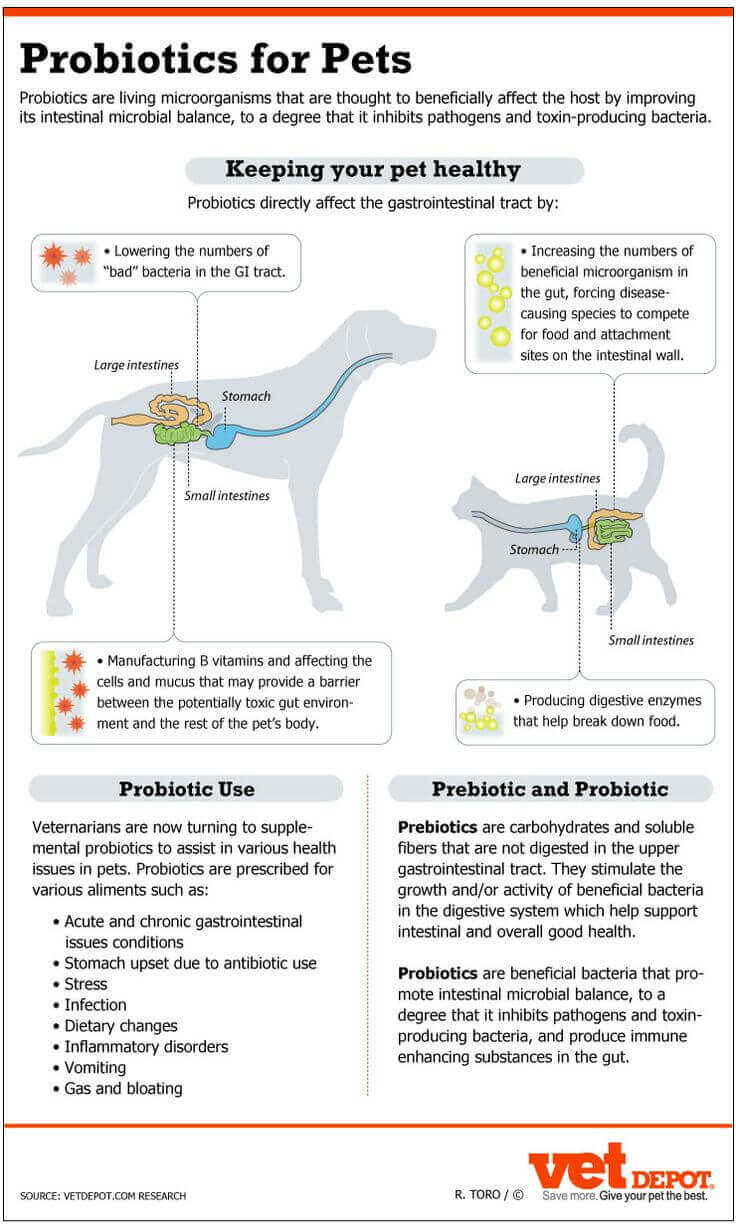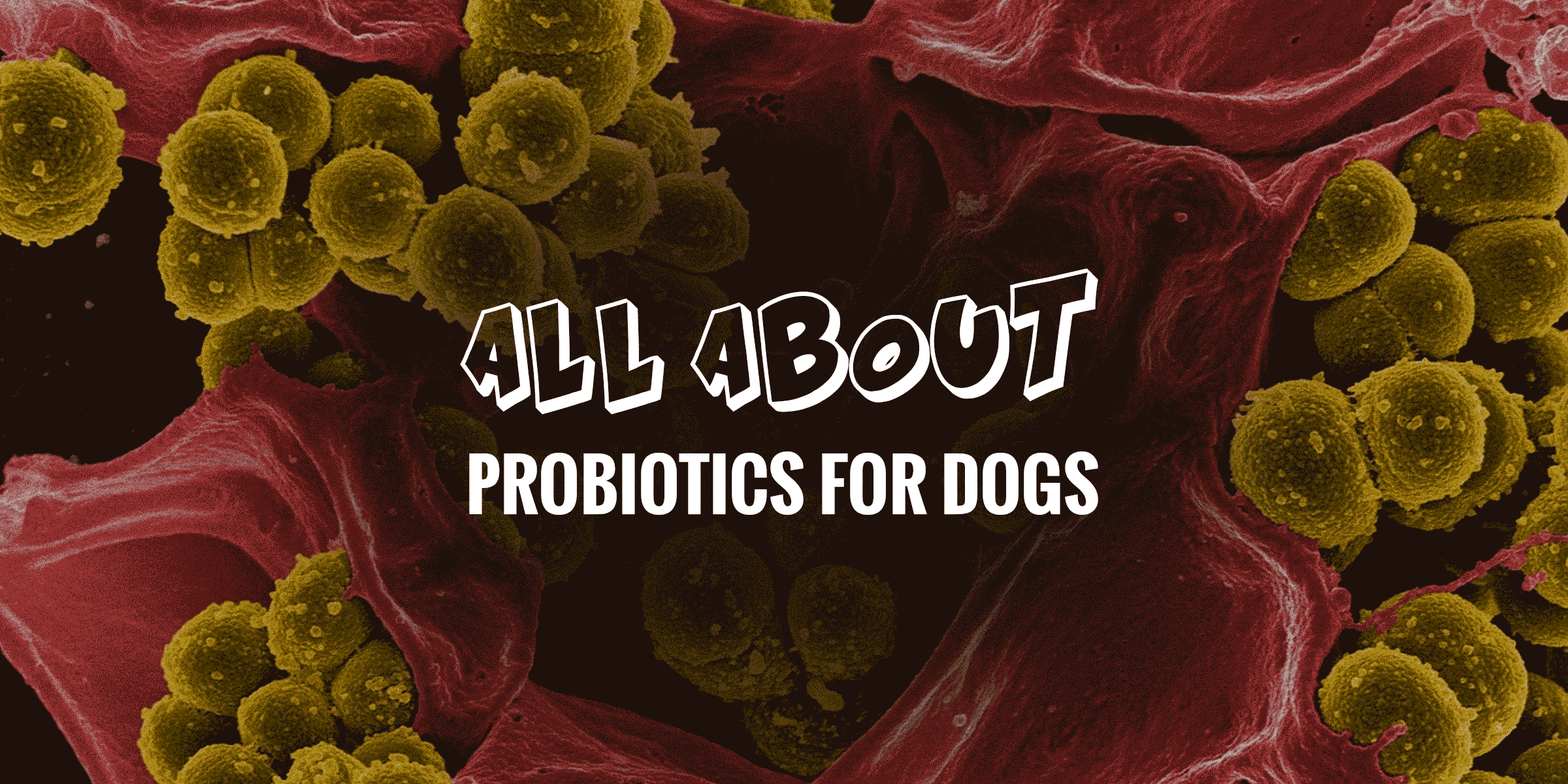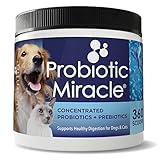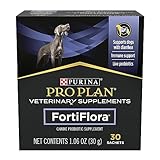Probiotics for dogs are rising in popularity thanks to observable positive effects on our dogs’ health. However, there is a confusion on what dog owners can expect from canine probiotics and how beneficial they can be in the short, but also long term.
Probiotics for dogs are not a miracle, but they are indeed very useful and recommended.
In this article, we are answering the most common questions about dog probiotics and keep everything as factual as possible by citing studies and sources when suitable. We have not been sponsored by any manufacturer and we remain unbiased, as always.
What exactly are probiotics for dogs?
Probiotics are living microorganisms that reside in the gastrointestinal tract and help support a healthy immune system. These good bacteria aid in nutrient absorption in the colon and prevent harmful bacteria like E. coli from increasing to dangerous levels.
Dogs have the shortest digestive system of all mammals, and it takes an average of six to eight hours for digestion to occur, compared to twenty to thirty hours in humans. The digestion process begins in the mouth, where the salivary glands and teeth break down food into its component parts, which are then absorbed in the small intestine as blood glucose, vitamins, and minerals.
The canine stomach is more acidic than the human stomach, which initially raised doubts about the effectiveness of probiotics. To protect bacterial strains from stomach acid, various methods such as capsules or pastes have been developed to ensure that the probiotics reach the large intestine intact.
There are specific strains of probiotics for canines, including Lactobacillus Plantarum, Bifidobacterium breve, Lactobacillus casei, Bifidobacterium lactis, Lactobacillus acidophilus, and Enterococcus faecium. Probiotics can be delivered in various forms, such as powdered or capsule form or even homemade kefir. Living probiotics are usually more effective, but studies have not conclusively proven this claim.
In summary, probiotics are beneficial microorganisms that support the digestive and immune systems of dogs. Specific strains have been developed for canines, and various delivery methods are available to ensure their effectiveness
What are the different types of probiotics?
The strains are specific for canines, and include the following:
- Lactobacillus Plantarum,
- Bifidobacterium breve,
- Lactobacillus casei,
- Bifidobacterium lactis,
- Lactobacillus acidophilus,
- Enterococcus faecium.
Probiotics are delivered in a powdered form, a capsule or prepared as part of homemade kefir. Probiotics are normally delivered as living bacterias, especially in capsules or kefir, but they can also be given to dogs as dead bacterias generally in powdered forms. Living probiotics are thought to be more efficient than dead ones, but we could not find any conclusive study to back this claim up.
What are the differences between probiotics and digestive enzymes for dogs?
Digestive enzymes are produced by the pancreas. Such enzymes are a type of protein that are specifically encoded to break down food so that it may be further metabolized by the body.
There are four kinds of digestive enzymes that break down fats, proteins, carbohydrates, and fiber. Specifically, they are:
- proteases to break down proteins,
- lipases to break down fats,
- amylases to break down carbohydrates, and
- cellulase to break down fiber.
These enzymes are secreted by the pancreas and break down food in the small intestine where they are absorbed. Digestive enzymes actually can kill probiotics. In order for probiotics to work effectively, they must make it alive to the large intestine or colon. Digestive enzymes are created by the body of the dog and are not a living organism like probiotics. They are sometimes added to a dog’s diet to help a dog break down and process food in a smoother fashion.

How often to give probiotics to a dog?
Daily supplementation of probiotics is recommended for dogs, especially after a course of antibiotics, if they’ve had diarrhea, or if they’re going through stressful situations. Probiotics are available in different forms, such as powders or capsules. However, there are some concerns about the quality of some supplements.
Probiotics are living organisms that can be destroyed by stomach acid and extreme temperatures. To ensure they arrive safely in the dog’s colon, prebiotics, such as acacia gum or inulin (a starchy fiber), are necessary. Prebiotics should be given just before or with probiotics to aid their optimal assimilation and digestion.
There is not enough research on the effectiveness of probiotics in healthy dogs, and studies in the area are limited. Unlike prescribed medication, there is no regulatory body that guarantees the accuracy of probiotic and prebiotic supplements. In fact, some products have been found to be inaccurate, which can be concerning for pet owners. Therefore, it may be better for dog owners to prepare their own probiotic solutions.
Jargon has been simplified, and grammar has been improved for better readability. The incorrect phrase has been corrected, and scientific statements have been explained in a way that is easily understandable for nonscientific individuals
Are probiotics good for dogs with allergies? Can probiotics for dogs help with itchiness and skin problems?
Recent studies suggest that probiotics can help dogs suffering from allergy problems. Allergies in dogs are like an overreaction of their immune system, leading to symptoms such as itchiness, red skin, frequent ear infections, and digestive problems like gas, bloating, and diarrhea (sometimes referred to as “leaky gut syndrome”). But there is some good news: research has shown that probiotics can reduce these symptoms, especially in dogs with atopic dermatitis.
Similarly, just like humans, dogs can also suffer from inflammatory bowel disease (IBD), which can cause alternating constipation and diarrhea. This disease may worsen if dogs prone to food allergies consume diets high in wheat or soy. Interestingly, studies in humans have shown that probiotics can be useful in managing IBD symptoms. Moreover, anecdotal evidence suggests that probiotics may also be effective in alleviating IBD symptoms in dogs.
In summary, probiotics have shown promising results in helping dogs with allergy problems and IBD. So, if your furry friend has been struggling with these issues, consider discussing probiotics with your veterinarian to see if they may be a helpful addition to their treatment plan.
Is yogurt a safe probiotic for dogs? Are human probiotics safe for dogs?
The bacteria in the human gut are not the same as those in dogs. While yogurt contains live cultures of bacteria that are harmless to dogs, they do not provide any significant benefits. Therefore, giving yogurt to your dog is not an effective way to deliver the right kinds of bacteria. Instead, you should consult with your veterinarian and consider purchasing a canine-specific supplement. Choose a brand that has been independently tested in a lab to ensure that the strains in the supplement are living and effective. Some sources suggest that kefir may be a good option as a supplement for dogs.
In summary, it’s not a good idea to give your dog yogurt as it does not provide any substantial benefits to them. Instead, you can explore other options, such as canine-specific supplements, after consulting with your veterinarian. When choosing a supplement, look for independent lab testing to ensure its effectiveness. Kefir can be a good supplement for dogs, according to some sources.
What probiotics are available on the market?
The top 3 most popular probiotics for dogs sold online are:
- Purina Fortiflora — contains Enterococcus Faecium (around $28 for 30 capsules)
- Nusentia Probiotic Miracle — contains seven strains of live bacteria and two prebiotics (around $18 for 30 capsules)
- Nutramax Proviable DC — a powdered alternative that contains six strains of bacteria (around $26 for 360 servings)
The powdered form of canine probiotic is definitely the cheaper alternative. Some commentators believe that dead bacteria found in the powdered probiotics can be replicated in the colon thanks to the genetic markers being sufficient for the colon to regenerate living strains within itself. Other specialists say that probiotics should only contain live bacterias with be useful. We’ll let you choose who to believe on this one, as no further conclusive research has been done.
What is a good recipe of Kefir for dogs?
Daily supplementation of probiotics can get pricey especially if a household has more than one dog. The internet has several good recipes for doing it yourself probiotics. Dogs many times are not able to digest cow’s milk since they lack the digestive enzymes that break down milk sugar (lactose). Goat’s milk is the alternative most often suggested as the reasonably priced alternative. The following recipe can be used to make some homemade probiotic
The ingredients you would need to prepare Kefir at home are as follows:
- Kefir starter grains (from Amazon approximately $2)
- Mason jar
- Cheesecloth
- Rubber band
- 1 cup goat’s milk or cow’s milk (prefer goat milk for dogs with lactose intolerance)
Then, follow these instructions to make your homemade kefir that will be packed with healthy probiotics for dogs:
- Sterilize the mason jar.
- Add one cup of raw goat’s milk
- Add 1 tablespoon of Kefir starter grains
- Secure the top of the mason jar with cheesecloth with a rubber band
- Leave the jar out of direct sunlight for 24 hours
- Strain out the kefir grains (may be used to make additional batches)
- A tablespoon of kefir may be mixed in with regular food.
Let your dog enjoy and live a healthier life. It’s very simple and very beneficial for dogs.




2 comments on “Probiotics for Dogs — FAQ, Definition, Benefits, Cost & Recipes”
Thank you for a super helpful overview of probiotics. I’m looking to get some for my own pups, but in general I’m enjoying your site and writing.
Its my understanding that fermented probiotics should be avoided by dogs who have a rise in histamines. There’s a study or two out about this.
Would have been good for you to mention SBO’s because they’re becoming popular for treatments.
There’s a lot to consider when supplementing a probiotic, I think someone could write a book, just on this topic. Its one pet parents need to research thoroughly.
Just briefly..
Histamine Lowering Probiotic Strains
Lactobacillus gasseri
Bifidobacterium infantis
Lactobacillus rhamnosus
Bifidobacterium longum
Lactobacillus plantarum – Lactobacillus plantarum does not appear to have an effect on histamine, but lowers/inhibits tyramine and putrescine.
Bifidobacterium breve
Lactobacillus salivarius
Bifidobacterium lactis
Bifidobacterium Bifidum
Lactobacillus reuteri- is kind of in a class by itself. Many place it in the “histamine producing” category, but interestingly enough, it doesn’t belong there. Lactobacillus reuteri does, in fact, cause histidine to convert to histamine, but this histamine raises cAMP which actually reduces the inflammatory response. Fascinating! I therefore put it in the “histamine reducing” class due to this aspect.
Prebiotics can also be found in..
Apple Cider Vinegar – organic, unpasteurized, unfiltered
Asparagus
Banana
Dark leafy greens; kale, spinach, dandelion greens, collard greens, etc
Garlic
Honey
Jerusalem artichoke
STUDIES for the readers..
Abstract
Assessment of commercial probiotic bacterial contents and label accuracy
ABSTRACT: Probiotics are widely available for use in animals but quality control of veterinary probiotics has been shown to be poor. The objective of this study was to evaluate the labels and bacterial contents of commercial probiotics marketed for use in animals. Twenty-five probiotics were purchased, labels were scrutinized, and bacterial contents were enumerated. Twenty-one (84%) products listed specific microorganisms. Expected bacterial numbers were listed for 15 (60%) products. One or more organisms were misspelled on the labels of 7/22 (32%) of products that listed specific organisms. Viable growth ranged from 0 to 2 × 109 colony forming units (CFU)/g. Only 4/15 (27%) products that had specific claims of viable organisms met or exceeded their label claim. Only 2 of these also had an acceptable label, which properly described the contents. Deficiencies in veterinary probiotic quality remain. Veterinarians and owners should scrutinize commercial probiotics and demand evidence of quality control and efficacy.
Follow this link to read the remainder of the study:
https://www.ncbi.nlm.nih.gov/pmc/articles/PMC3003573/
Manipulating the gut microbiota to maintain health and treat disease
Abstract
Background: The intestinal microbiota composition varies between healthy and diseased individuals for numerous diseases. Although any cause or effect relationship between the alterations in the gut microbiota and disease is not always clear, targeting the intestinal microbiota might offer new possibilities for prevention and/or treatment of disease.
Objective: Here we review some examples of manipulating the intestinal microbiota by prebiotics, probiotics, and fecal microbial transplants.
(NB The authors have not received any funding or benefits from industry or elsewhere to conduct this study.)
Read more…. http://journals.co-action.net/index.php/mehd/article/view/25877/38222
https://kibowbiotech.com/pdf/PROBIOTIC_THERAPY_UREMIA.pdf
Choosing The Best Probiotic-Based Supplement For My Dog
A 2011 study by Scott Weese scientifically tested and reviewed 25 animal probiotic supplements – including most of the major brands.
The results of his study were shocking!… look it up sometime.
I could go on and on lol